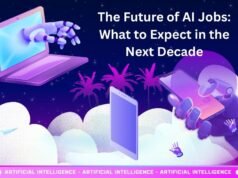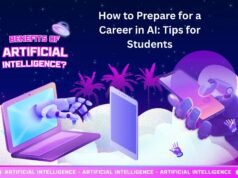Artificial Intelligence (AI) is not only transforming industries but also reshaping the job market by introducing new roles and redefining existing ones. This study module explores the various ways AI is creating new job opportunities, the types of roles emerging, and the skills required to thrive in this evolving landscape.
Introduction
The integration of AI into various sectors has led to significant changes in the workforce. While there are concerns about job displacement due to automation, AI also presents opportunities for job creation in areas that require human oversight, creativity, and advanced technical skills.
The Dual Impact of AI on Employment
AI’s influence on employment is twofold:
- Job Displacement: Automation of routine tasks can lead to the reduction of certain job roles.
- Job Creation: Emergence of new roles that focus on developing, managing, and enhancing AI technologies.
According to the World Economic Forum, AI is expected to create 97 million new jobs by 2025, offsetting the displacement of 85 million jobs, resulting in a net gain of 12 million jobs globally.
Emerging AI-Driven Job Roles
The rise of AI has led to the creation of several new job roles across various industries:
1. AI Trainers and Operators
- Role: Develop and fine-tune AI models by providing data inputs and correcting outputs to improve accuracy.
- Skills Required: Understanding of machine learning concepts, data annotation, and domain-specific knowledge.
2. AI Ethics Specialists
- Role: Ensure that AI systems operate within ethical guidelines, addressing issues like bias, fairness, and transparency.
- Skills Required: Knowledge of ethical frameworks, legal regulations, and cultural sensitivities.
3. AI Maintenance and Support Staff
- Role: Provide technical support and maintenance for AI systems, ensuring their smooth operation.
- Skills Required: Technical troubleshooting, system monitoring, and customer service skills.
4. AI-Generated Work Auditors
- Role: Review and assess outputs produced by AI systems to ensure quality and compliance with standards.
- Skills Required: Attention to detail, understanding of AI processes, and industry-specific knowledge.
5. Chief AI Officers (CAIO)
- Role: Oversee an organization’s AI strategy, implementation, and governance.
- Skills Required: Leadership, strategic planning, deep understanding of AI technologies, and business acumen.
Sectors Experiencing AI-Driven Job Creation
AI is influencing job creation across various sectors:
1. Healthcare
- AI in Diagnostics: Development of AI tools for disease detection and personalized treatment plans.
- Emerging Roles: AI specialists in medical imaging, health data analysts, and telemedicine coordinators.
2. Finance
- AI in Financial Services: Automation of trading, fraud detection, and customer service through chatbots.
- Emerging Roles: AI financial analysts, robo-advisor developers, and AI compliance officers.
3. Manufacturing
- AI in Production: Use of AI for predictive maintenance, quality control, and supply chain optimization.
- Emerging Roles: AI-driven process engineers, smart factory managers, and robotics technicians.
4. Retail
- AI in Customer Engagement: Personalized shopping experiences and inventory management through AI.
- Emerging Roles: AI marketing strategists, e-commerce data analysts, and virtual store designers.
Skills Required for AI-Driven Roles
To thrive in AI-driven job roles, individuals should focus on developing the following skills:
- Technical Proficiency: Understanding of AI and machine learning algorithms, programming languages (e.g., Python, R), and data analysis.
- Analytical Thinking: Ability to interpret complex data and make data-driven decisions.
- Ethical Awareness: Knowledge of ethical considerations in AI deployment, including bias mitigation and data privacy.
- Adaptability: Willingness to continuously learn and adapt to evolving AI technologies.
- Interdisciplinary Collaboration: Ability to work across various domains, integrating AI solutions into different sectors.
Preparing for the AI-Driven Job Market
Individuals and organizations can take proactive steps to prepare for the AI-driven job market:
1. Education and Training
- Formal Education: Pursue degrees or certifications in AI, data science, or related fields.
- Continuous Learning: Engage in online courses, workshops, and seminars to stay updated with the latest AI advancements.
2. Skill Development
- Technical Skills: Gain proficiency in programming, data analysis, and machine learning.
- Soft Skills: Develop problem-solving, critical thinking, and communication skills.
3. Industry Engagement
- Networking: Participate in AI conferences, meetups, and professional groups to connect with industry experts.
- Practical Experience: Undertake internships, projects, or research opportunities to gain hands-on experience.
Challenges and Considerations
While AI offers numerous opportunities, it also presents challenges that need to be addressed:
- Ethical Concerns: Ensuring AI systems are fair, transparent, and respect user privacy.
- Skill Gaps: Bridging the gap between current workforce skills and those required for AI roles.
- Regulatory Compliance: Navigating the evolving legal landscape surrounding AI deployment.
Conclusion
AI is a catalyst for job creation, introducing new roles that require a blend of technical expertise, ethical awareness, and adaptability. By understanding the emerging opportunities and developing the necessary skills, individuals can position themselves for success in the evolving job market.
Further Reading
For more information on how AI is creating new job roles, consider exploring the following resources:
- 20 New And Enhanced Roles AI Could Create
- How Does Artificial Intelligence Create New Jobs?
- Jobs AI will create? Here’s the World Economic Forum view
- Chief AI officer
By staying informed and proactive, individuals and organizations can harness the potential of AI to drive innovation and growth in the job market.















Hi there Dear, are you really visiting this web site daily, if so afterward you will without
doubt obtain good experience.